【高一同步教程】高中英语必修1现在进行时表将来用法讲解及练习
- 格式:doc
- 大小:55.00 KB
- 文档页数:4

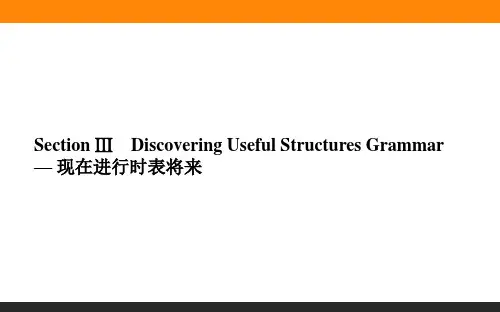
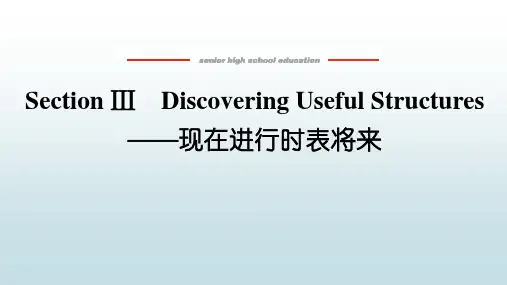
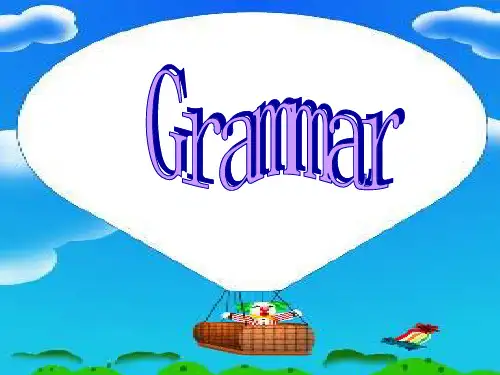
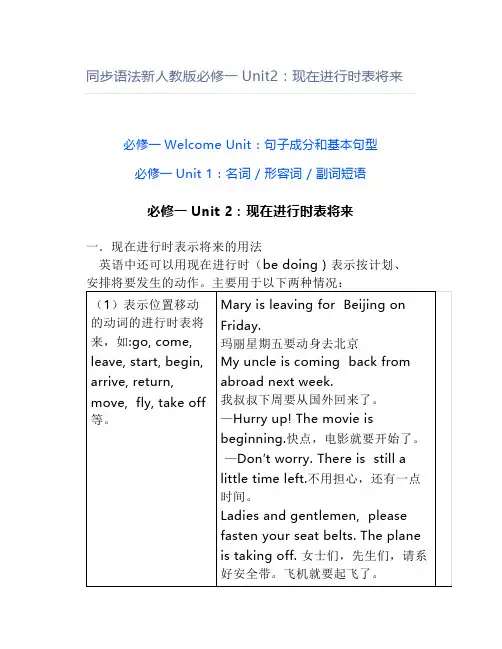
同步语法新人教版必修一Unit2:现在进行时表将来必修一Welcome Unit:句子成分和基本句型必修一Unit 1:名词 / 形容词 / 副词短语必修一Unit 2:现在进行时表将来4. I think it is true that Jill _______ to work today because she ison a trip.A. has comeB. didn’t comeC. is comingD. will not come5.—I heard your father hadgone to Beijing on business. —Yes. And he_____ in three weeks.A. will returnB. has returnedC. returnedD. returns6. —Have you watched the new movie Kung Fu Panda 3, Kelly?—Not yet. I _______ it with my classmate tonight.A. will watchB. was watchingC.have watched7. Just go down this road and you _______ the library next to thebank.A. seeB. sawC. have seenD.will see8. We ______ have a picnic together with our teachers next Thursday.A. are goingB. are going toC. will goingD. may going to9. Many scientists believe that robots ______ able to talk likehumans in 50 years.A. wereB. areC.will beD.have been10.—Did you call Jenny? —Ohno, I forgot. I ______ her right away.A. calledB. havecalledC. callD. will call11. If we ______ take environmental problems seriously, the earth______ worse and worse.A. don’t; won’t beB.won’t; isn’tC. won’t; isD.don’t; will be12. The summer holidays______,so the twins as well as Jack are going to Hong Kong for vacation.A. is comingB.are comingC. comese13. I’m busy now. I ____ to yo u after school this afternoon.A. talkB. talkedC. will talkD. have talked14. — I hope there _______ less pressure on us today.— If so, we _______ enjoy amore pleasant life.A. is; canB.will be; canC. will be; shouldD.is; should15. —Have you returned thebook to the library yet?—Not yet. Don’t worry. I ______ it soon.A. returnB. returnedC. have returnedD. will return16. Stop smoking, Joe! You _____ yourself if you keep on doing itlike that!A. will killB. havekilledC. killD. killed17.-Do you have any plansfor tonight?-Yes ,I _____ at the new Italian restaurant intown. A. eat B. have eatenC. ateD. am going to eat18. —Which singer do youthink ____ the Voice of China?—I'm not sure. There are still 3 rounds to come.A. wonB. has wonC. will winD. wins19. Flight BA 2793 _____ at 8:20. Hurry up!A. leavesB. leftC. has leftD. leaving20. Jenny ________on holiday now. I wonder when she ________back.A. is being ; comesB. is ; is comingC. will be ; will comeⅠ.单句语法填空1.—You are wanted on the phone, Ann!—OK,I ________ (come).2.If I see him, I________ (give) him your message.3.I think Mr. Li ________ (leave) here for Beijing to attend a meeting in two days.ually the new term________ (start) on August 29th.5. When summer (come), they will invite their students to pick the fresh vegetables!6. His plane ________ (take) off at 8:00 a.m.tomorrow.Would you like to see him off?7. We________ (fly) to Shanghai tomorrow so we’d better get our package packed now.8. If you________ (come) to my hometown next month, I’ll treat you to a big dinner.9. Please call the station to make sure when the earliest train________ (leave).10. When our guest ________ (arrive), I will pick him up at the airport.Ⅱ.单句改错1.If you will visit him, I will go with you.2.The bus leave at 6:00 p.m.3.I was seeing him off this afternoon.4.The concert is take place next Sunday.参考答案1-5 CBDDA 6-10 ADBCD11-15 DBCBD 16-20 ADCABⅠ.单句语法填空1.am coming2. will give3. is leaving4. starts5. comes6. takes7. are flying 8. come9. leaves 10. arrivesⅡ.单句改错1.去掉第一个will2. leave→leaves3. was→am4. 在is后加to。
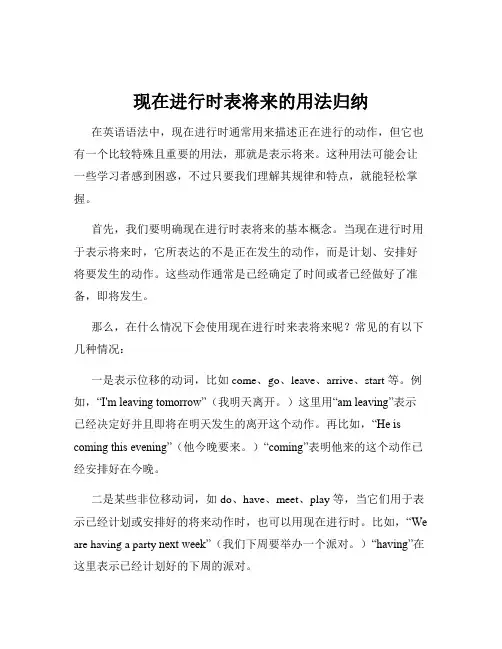
现在进行时表将来的用法归纳在英语语法中,现在进行时通常用来描述正在进行的动作,但它也有一个比较特殊且重要的用法,那就是表示将来。
这种用法可能会让一些学习者感到困惑,不过只要我们理解其规律和特点,就能轻松掌握。
首先,我们要明确现在进行时表将来的基本概念。
当现在进行时用于表示将来时,它所表达的不是正在发生的动作,而是计划、安排好将要发生的动作。
这些动作通常是已经确定了时间或者已经做好了准备,即将发生。
那么,在什么情况下会使用现在进行时来表将来呢?常见的有以下几种情况:一是表示位移的动词,比如 come、go、leave、arrive、start 等。
例如,“I'm leaving tomorrow”(我明天离开。
)这里用“am leaving”表示已经决定好并且即将在明天发生的离开这个动作。
再比如,“He is coming this evening”(他今晚要来。
)“coming”表明他来的这个动作已经安排好在今晚。
二是某些非位移动词,如 do、have、meet、play 等,当它们用于表示已经计划或安排好的将来动作时,也可以用现在进行时。
比如,“We are having a party next week”(我们下周要举办一个派对。
)“having”在这里表示已经计划好的下周的派对。
三是一些表示交通方式的动词短语,如 take off(起飞)、land(着陆)等。
比如,“The plane is taking off in an hour”(飞机一小时后起飞。
)在使用现在进行时表将来时,我们需要注意一些要点。
其一,这种用法通常与表示将来的时间状语连用,像 tomorrow、next week、soon、in a few days 等。
这能让听话者更加明确动作发生的时间。
其二,现在进行时表将来强调的是动作的计划性和确定性。
如果只是一种可能性或者不太确定的将来动作,就不太适合用现在进行时。
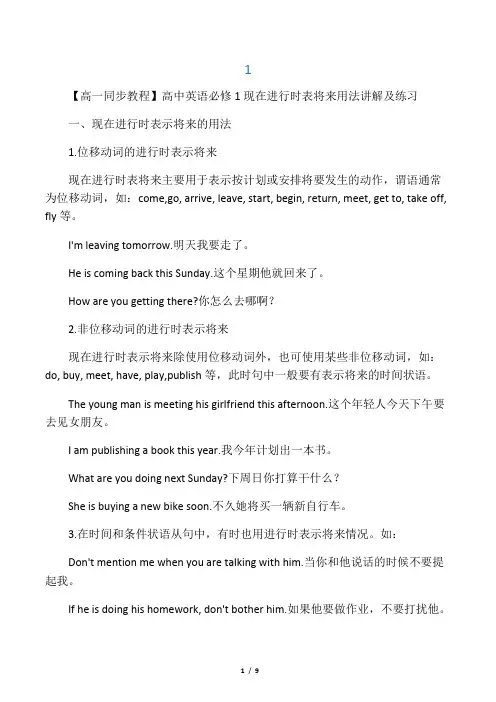
1【高一同步教程】高中英语必修1现在进行时表将来用法讲解及练习一、现在进行时表示将来的用法1.位移动词的进行时表示将来现在进行时表将来主要用于表示按计划或安排将要发生的动作,谓语通常为位移动词,如:come,go, arrive, leave, start, begin, return, meet, get to, take off, fly等。
I'm leaving tomorrow.明天我要走了。
He is coming back this Sunday.这个星期他就回来了。
How are you getting there?你怎么去哪啊?2.非位移动词的进行时表示将来现在进行时表示将来除使用位移动词外,也可使用某些非位移动词,如:do, buy, meet, have, play,publish等,此时句中一般要有表示将来的时间状语。
The young man is meeting his girlfriend this afternoon.这个年轻人今天下午要去见女朋友。
I am publishing a book this year.我今年计划出一本书。
What are you doing next Sunday?下周日你打算干什么?She is buying a new bike soon.不久她将买一辆新自行车。
3.在时间和条件状语从句中,有时也用进行时表示将来情况。
如:Don't mention me when you are talking with him.当你和他说话的时候不要提起我。
If he is doing his homework, don't bother him.如果他要做作业,不要打扰他。
You must visit Switzerland when you are travelling in Europe.你在欧洲旅行时一定要访问瑞士。

高中英语必修一知识讲解-现在进行时表将来-CAL-FENGHAI-(2020YEAR-YICAI)_JINGBIAN现在进行时表将来概念引入现在进行时是我们非常熟悉的时态,常表示说话时正在发生的动作,如:Why are you crying Is something wrong 你为什么在哭有什么不对吗但是观察这些句子:1. I’m going. 我要走了。
2. What are you doing next Sunday 下星期你打算干什么3. Don’t forget: you are taking part too. 不要忘记:你也要参加。
4. She is going to the dentist tomorrow because she is having a tooth filled.她明天要去看牙医,因为她的牙需要补。
这些句子中的谓语动词都是现在进行时,但是谈论的都是将来的事,这就是本单元我们要学习的内容。
语法讲解【高清课程unit3 语法】现在进行时表将来1. 现在进行时表示将来主要用于表示按照计划或安排将要发生的动作或事件,常表示最近或较近的将来,有“意图”、“安排”或“打算”,给人期待感,多是转移动词,如:come, go, start, arrive, leave, stay等。
I’m leaving tomorrow.我打算明天离开。
Are you staying here till next week 你要在这儿待到下个星期吗They’re coming here this afternoon.今天下午他们要来这儿。
She is leaving on the New York flight. 她要乘飞纽约的航班去。
Do you know if he is going to school tomorrow 你知道明天他上不上学吗What time are you coming back 你准备什么时候回来I am starting early tomorrow morning. 我打算明天一早就动身。
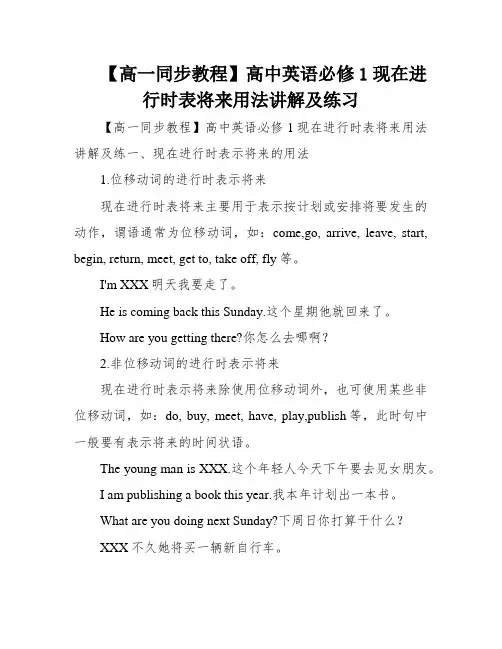
【高一同步教程】高中英语必修1现在进行时表将来用法讲解及练习【高一同步教程】高中英语必修1现在进行时表将来用法讲解及练一、现在进行时表示将来的用法1.位移动词的进行时表示将来现在进行时表将来主要用于表示按计划或安排将要发生的动作,谓语通常为位移动词,如:come,go, arrive, leave, start, begin, return, meet, get to, take off, fly等。
I'm XXX明天我要走了。
He is coming back this Sunday.这个星期他就回来了。
How are you getting there?你怎么去哪啊?2.非位移动词的进行时表示将来现在进行时表示将来除使用位移动词外,也可使用某些非位移动词,如:do, buy, meet, have, play,publish等,此时句中一般要有表示将来的时间状语。
The young man is XXX.这个年轻人今天下午要去见女朋友。
I am publishing a book this year.我本年计划出一本书。
What are you doing next Sunday?下周日你打算干什么?XXX不久她将买一辆新自行车。
3.在时间和条件状语从句中,有时也用进行时表示将来情况。
如:XXX.当你和他说话的时候不要提起我。
If he is doing his homework, XXX.假如他要造作业,不要打搅他。
XXX.你在欧洲游览时肯定要拜候瑞士。
If she’s still waiting, tell her to go home.如果她还在等,可以让她回家。
You can do some reading while you are waiting for the train.你等火车时可以看看书。
Suppose it’XXX, shall we go?假定来日诰日还在下雨,我们要去吗?2、目前进行时的根本用法1.表示目前(指说话人说话时)正在产生的工作。
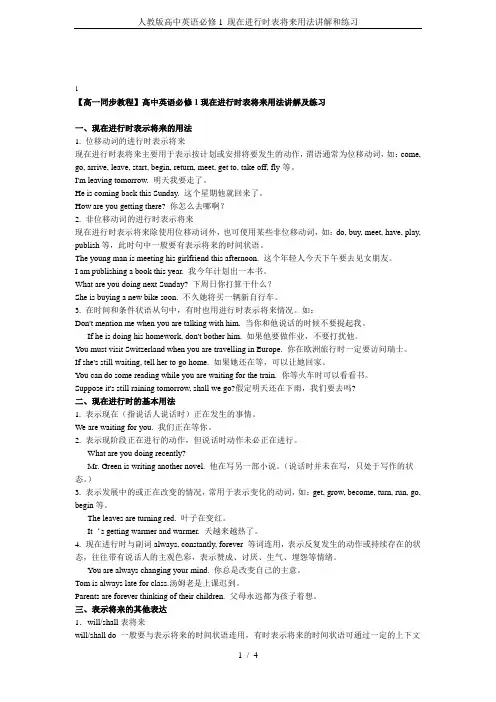
1【高一同步教程】高中英语必修1现在进行时表将来用法讲解及练习一、现在进行时表示将来的用法1. 位移动词的进行时表示将来现在进行时表将来主要用于表示按计划或安排将要发生的动作,谓语通常为位移动词,如:come, go, arrive, leave, start, begin, return, meet, get to, take off, fly等。
I'm leaving tomorrow. 明天我要走了。
He is coming back this Sunday. 这个星期他就回来了。
How are you getting there? 你怎么去哪啊?2. 非位移动词的进行时表示将来现在进行时表示将来除使用位移动词外,也可使用某些非位移动词,如:do, buy, meet, have, play, publish等,此时句中一般要有表示将来的时间状语。
The young man is meeting his girlfriend this afternoon. 这个年轻人今天下午要去见女朋友。
I am publishing a book this year. 我今年计划出一本书。
What are you doing next Sunday? 下周日你打算干什么?She is buying a new bike soon. 不久她将买一辆新自行车。
3. 在时间和条件状语从句中,有时也用进行时表示将来情况。
如:Don't mention me when you are talking with him. 当你和他说话的时候不要提起我。
If he is doing his homework, don't bother him. 如果他要做作业,不要打扰他。
You must visit Switzerland when you are travelling in Europe. 你在欧洲旅行时一定要访问瑞士。
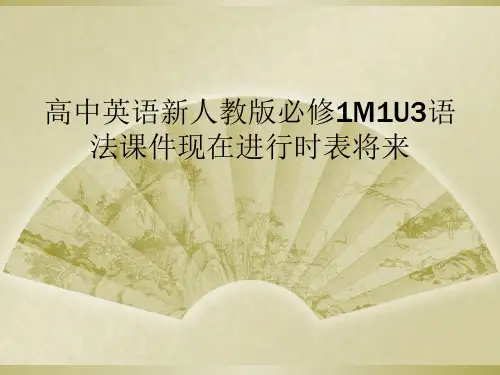
第十二讲重点语法讲与练现在进行时表将来[语法精释]一、现在进行时的基本用法1.现在进行时表示说话时正在进行的尚未完成的动作或状态。
What is your brother doing now, Bob?鲍勃,你兄弟正在干什么?Look!They are watching TV.看,他们正在看电视2.现在进行时表示目前这段时间正在进行的动作。
现在进行时可表示目前这段时间正在进行,但此时此刻未必正在进行的动作。
These days, we are reading newspaper.这些天,我们一直在读报纸。
3.现在进行时与always, constantly, all the time等副词(短语)连用时,可表反复性、一贯性动作,常用来表示赞扬、生气、不满、厌恶等感情色彩。
He is always eating the snacks.他老是吃零食。
She is constantly giving up halfway.她总是半途而废。
[即学即练1]完成句子(1)我们正在公交车站等公交车。
We ________ (wait) for the bus in the bus stop.(2)格林先生在写另一部科幻小说,是关于宇宙大爆炸的。
Mr. Green ________ (write) another science fiction about The Big Bang.(3)他总是先想着怎么去对别人好。
He is ________ (think) of how to help others well first.二、现在进行时表示将来的用法1.动词come, go, arrive, leave, start, begin, return等的现在进行时可以表示将来的动作,常有“意图”“安排”或“打算”的含义。
这种用法比较生动,给人一种期待感。
它常表示最近或较近的将来会发生的动作。
The train is coming soon.火车不久后就进站了。
Unit3 单元语法详解现在进行时表将来现在进行时主要表示现在或目前正在进行的动作。
然而在特殊情况下,现在进行时还可表示将来,主要用于表示按计划或安排要发生的动作,翻译为“打算……”、“将要……”。
通常会有表示将来的时间状语如tomorrow、next week等,但有明确的上下文的时候不需要指出时间。
能用于现在进行时表将来的动词常见的有:go、come、leave、start等。
一、表示将来的动作,多指已计划好的事I'm leaving for Beijing tomorrow.我明天去北京。
I'm going.我要走了。
I'm coming.我要来了。
When are you starting?你什么时候动身?She is buying a new bike soon.她不久将买一辆新自行车。
We are flying to Shanghai next Friday.下周五我们乘飞机去上海。
例1 She (leave) tomorrow and you had better see her off.解析:本句考查时态,由时间状语tomorrow可知用现在进行时表将来。
答案:is leaving二、现在进行时也可在时间状语从句、条件状语从句中表示将来When you are passing by my front door,please drop in on me.当你从我家门前经过,请顺便来看看我。
注意:现在进行时的其他用法:1.表示现在或近期正在进行的情况。
I am writing a letter now.我现在正在写信。
Mr Green is writing another novel these days.格林先生这些天正在写另一部小说。
例2 Listen!The couple(quarrel)in the next room.解析:由语境及“Listen!”可知应用现在进行时。
语法全解:现在进行时表示将来一、现在进行时表示将来时注:现在进行时表示将来时,其计划性较强,往往暗示该动作是可以改变的1.现在进行时除表示现在正在进行的动作之外,还可以表示较近的将来,常有“意图”, “安排”或“打算”的含义.这种用法比较生动,给人一种期待感,此时所使用的动词多是转移动词,如:come, go, start, leave, stay, go, travel, take off, fly, see, arrive, return等.例如: I am leaving tomorrow. 我明天要离开.Are you staying here till next week? 你要在这儿呆到下周吗?I am going.我要走了.We’re leaving for Nanjing tomorrow.我们明天就去南京.When are you leaving? 你们什么时候动身?They’re coming here this afternoon. 他们今天下午来这儿.2.表示将来的现在进行时除用于转移动词外,也可用于某些非转移动词.如do, buy, meet, have, play, publish等,此时句中一般要要表示将来的时间状语.例如: What are you doing next Sunday? 下星期天你打算干什么?My mother is buying me a bike soon. 我妈妈不久将给我买一辆自行车.I’m meeting you after class. 课后我要找你.3.现在进行时偶尔也表示较远的将来.例如: When I grow up, I’m joining the army. 我长大了要参军.4.表示将来的现在进行时有时含有“决心”的意思,多用于否定结构中.例如: I’m not going there. 我不去那儿了.I’m not waiting for him any longer. 我不再等他了.二.一般现在时表将来时注:一般现在时表示将来时,客观性较强,多指按时刻或规定要发生的动作或事件,适用于这种用法的动词往往表示“出发”, “到达”等,如arrive, leave, start, go等.例如: The plane arrives at 2:30 this afternoon. 飞机将于今天下午2:30抵达.。
【高一同步教程】高中英语必修1现在进行时表将来用法讲解及练习一、现在进行时表示将来的用法1. 位移动词的进行时表示将来现在进行时表将来主要用于表示按计划或安排将要发生的动作,谓语通常为位移动词,如:come, go, arrive, leave, start, begin, return, meet, get to, take off, fly等。
I'm leaving tomorrow. 明天我要走了。
He is coming back this Sunday. 这个星期他就回来了。
How are you getting there? 你怎么去哪啊?2. 非位移动词的进行时表示将来现在进行时表示将来除使用位移动词外,也可使用某些非位移动词,如:do, buy, meet, have, play, publish等,此时句中一般要有表示将来的时间状语。
The young man is meeting his girlfriend this afternoon. 这个年轻人今天下午要去见女朋友。
I am publishing a book this year. 我今年计划出一本书。
What are you doing next Sunday? 下周日你打算干什么?She is buying a new bike soon. 不久她将买一辆新自行车。
3. 在时间和条件状语从句中,有时也用进行时表示将来情况。
如:Don’t mention me when you are talking with him. 当你和他说话的时候不要提起我。
If he is doing his homework, don’t bother him. 如果他要做作业,不要打扰他。
You must visit Switzerland when you are travelling in Europe. 你在欧洲旅行时一定要访问瑞士。
If she’s still waiting, tell her to go home. 如果她还在等,可以让她回家。
You can do some reading while you are waiting for the train. 你等火车时可以看看书。
Suppose it’s still raining tomorrow, shall we go?假定明天还在下雨,我们要去吗?二、现在进行时的基本用法1. 表示现在(指说话人说话时)正在发生的事情。
We are waiting for you. 我们正在等你。
2. 表示现阶段正在进行的动作,但说话时动作未必正在进行。
What are you doing recently?Mr. Green is writing another novel.他在写另一部小说。
(说话时并未在写,只处于写作的状态。
)3. 表示发展中的或正在改变的情况,常用于表示变化的动词,如:get, grow, become, turn, run, go, begin等。
The leaves are turning red. 叶子在变红。
It‘s getting warmer and warmer. 天越来越热了。
4. 现在进行时与副词always, constantly, forever 等词连用,表示反复发生的动作或持续存在的状态,往往带有说话人的主观色彩,表示赞成、讨厌、生气、埋怨等情绪。
You are always changing your mind. 你总是改变自己的主意。
Tom is always late for class.汤姆老是上课迟到。
Parents are forever thinking of their children. 父母永远都为孩子着想。
三、表示将来的其他表达1.will/shall表将来will/shall do 一般要与表示将来的时间状语连用,有时表示将来的时间状语可通过一定的上下文来体现。
will可用于各种人称,而shall多用于第一人称。
The building will be finished next month. 这座大楼将于下个月竣工。
Which paragraph shall I read first?我先读哪一段呢?Will you be at home at seven this evening? 今晚七点回家好吗?2.be going to do表将来1)表示个人的计划、打算和意图或表示按计划或安排将要发生的事。
What are you going to do tomorrow? 明天打算作什么呢?The play is going to be produced next month。
这出戏下月开播。
2)有迹象表明要发生的事,一般指客观事态的发展。
Look at the dark clouds, there is going to be a storm. 看那乌云,快要下雨了。
3.be to do 表将来1)表示按计划或安排将要发生的动作,表示客观安排或受人指示而做某事,往往是不容改变的。
The meeting is to take place next Monday. 会议定于下星期一举行。
The French President is to visit China in June. 法国总统将于6月访问中国。
We are to discuss the report next Saturday. 我们下星期六讨论这份报告。
2)用来表示注定要发生或不可避免要发生的事。
如:His theory was to change the views on the universe. 他的理论势必要改变(人类)对宇宙的看法。
3)表示命令,意为“必须或应该”,在意义上等于must,should,ought to 或have to。
如:You are to finish the work before five this afternoon. 你们必须在今天下午五点以前完成这项任务。
This medicine is to be taken three times a day. 这种药一天要服三次。
4.be about to do表将来表示“马上做某事,刚要,正要”,表示非常近的将来,不能与表示将来的时间状语连用。
He is about to leave for Beijing. 他马上要去北京。
I am about to start. 我就要出发了。
5. 一般现在时表将来1)多指按时刻表或规定将要发生的动作。
主要用于come, go, arrive, leave, start, begin, return等瞬间动词,表示在时间上已确定或安排好的事情。
例如:The train leaves at six tomorrow morning. 火车明天上午六点开。
When does the bus star? It stars in ten minutes. 汽车什么时候开?十分钟后。
2)用于时间状语从句或条件状语从句中。
例如:I'll write to you as soon as I arrive there. 我到了那里,就写信给你。
We are going fishing if it doesn’t rain tomorrow. 如果明天天不下雨,我们就去钓鱼。
3)在动词hope, take care that, make sure that等的宾语从句中。
例如:I hope they have a nice time next week. 我希望他们下星期玩得开心。
Make sure that the windows are closed before you leave the room. 离开房间前,务必把窗户关了。
4)以here, there等开始的倒装句,表示动作正在进行。
例如:Here comes the bus. = The bus is coming. 车来了。
There goes the bell. = The bell is ringing. 铃响了。
四、注意事项1. be going to / will 辨析be going to表示个人的计划、打算和意图或表示按计划或安排将要发生的事。
will用来表示临时决定。
用于条件句时,be going to表将来,will表意愿。
If you are going to make a journey, you'd better get ready for it as soon as possible.如果你想去旅行,你最好尽快的准备。
Now if you will take off your clothes, we will fit the new clothes on you in front of the mirror.2. be to do/be going to 辨析be to do 表示客观安排或受人指示而做某事。
be going to 表示个人主观的打算或计划。
I am to play football tomorrow afternoon. 明天下午我去踢球。
(客观安排)I'm going to play football tomorrow afternoon. 明天下午我想去踢球。
(主观安排)3. 现在进行时表将来和一般现在时表将来的区别现在进行时表将来,其计划性较强,往往暗示该动作是可以改变的。
一般现在时表将来,客观性较强,多指按时刻表或规定要发生的动作或事件。
I’m not going out this evening. 今晚我不准备出去。
The plane arrives at 2:30 this afternoon. 飞机将于今天下午2:30抵达。
4. 现在进行时表将来与现在进行时的区别前者通常用瞬间动词。
后者通常用延续性动词。
The famous scientist is arriving soon. 那位著名的科学家马上就要到了。
The young lady is writing a letter to her friend. 这位年轻的女士正在给朋友写信。
5. 一般现在时代替一般将来时表将来在when ,while, before, after, till, once, as soon as, so long as, by the time, if, in case (that), unless, even if, whether, the moment, the minute, the day, the year, immediately等引导的时间状语从句,条件状语从句中,用一般现在时代替将来时。